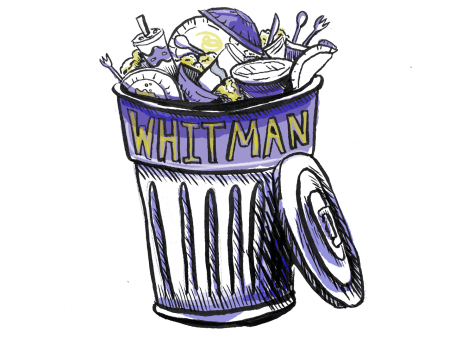Newly reopened Cleveland Commons strives to increase sustainability
September 30, 2021

Returning students and first-years alike may have noticed that the array of cutlery and plates at Cleveland Commons has been inconsistent this semester. At times students come in to find paper plates with metal knives and forks, or plastic cutlery with regular plates or even to-go boxes as the only choice.
First-year Alejandro Mata has been confused by the use of disposable dishes at the dining hall. He is specifically concerned about the lack of recycling of these items in the waste disposal area, as most students discard their plastic cups and paper plates in the same trash bins as their food waste.
General Manager of Bon Appetit for Whitman College, Shannon Null explained the inconsistent use of disposable ware and the seeming lack of emphasis on recycling. These irregularities are symptomatic of greater underlying issues facing the foodservice industry at large, as well as Bon Appetit’s operation in Walla Walla specifically.
Null is glad to be serving meals for indoor consumption after spending most of the last year offering exclusively grab and go service. Now that Cleveland is in full service, shutting down is simply not an option with a good portion of the student population depending entirely on Bon Appetit for their daily meals. COVID-19 related safety is thus high on her list of priorities.
Null is proud to say that her staff is 100 percent vaccinated, although this thoroughness has other repercussions. Most notably, it reduces her labor pool significantly. Many potential workers in the Walla Walla area are not vaccinated, with just 63.1% percent of people fully vaccinated in Walla Walla County, according to the Walla Walla County Department of Community Health. This means a greater workload for the smaller group of employees, and inevitably reduced efficiency in certain areas.
Null has been able to hire some more employees recently, but most are hired as cooking staff. Dishwashers and janitors are particularly hard to come by. Null states that often she has just two to three people working on dishes, when before the pandemic the number was closer to five.
On the topic of inconsistency in use and type of disposable dinnerware, Null cited supply chain problems brought on by COVID-19. These problems have also spread to food supply, often forcing improvisations for menu plans and cooking.
Null was also eager to explain the recycling situation. Bon Appetit recycles massive quantities of cardboard and aluminum packaging every week, and soiled cardboard products, like used paper plates, cannot be recycled. Additionally, the City of Walla Walla does not recycle plastic, meaning that Bon Appetit has no choice but to dispose of plastic items in the regular trash.
On the food waste front, Null highlighted Bon Appetit’s ongoing distribution of vegetable scraps to local farms. She also noted that with the amount of weekly food waste on the consumer end, composting is not feasible. To help in the tackling of these issues, Null has recently hired junior Lucy Wood as Bon Appetit Student Sustainability Coordinator. In this role, Wood is tasked with “helping distribute food scraps to local farms, helping manage the eco-container program, helping increase student messaging about compost and recycling … and Bon Appetit’s sustainability initiatives,” Wood said.
Wood puts particular emphasis on the eco-container program, nominating it as the best solution for now in reducing use of disposable containers as long as the shortage of dishwashers remains a problem. However, another problem has arisen in this regard.
“The other reason for using more disposable takeout containers is because students are not bringing back eco-containers,” Wood said. “We now have a shortage of eco-containers,” which further narrows Bon Appetit’s options for reusable dishes.
Despite COVID-19 related setbacks, Bon Appetit is making tangible efforts to create a more sustainable dining experience.




